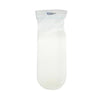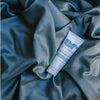Why do some skincare products cause a negative reaction?
Your skin's health is important, and anything you can do to protect it is ultimately a good thing. Taking care of your skin encourages collagen production, keeps it smooth on the surface, and helps it to protect itself from trauma, like the kind that can be caused by wearing a prosthesis. Skin care products usually help you care for your skin, but sometimes the product becomes the problem.
Sometimes, using a new product or a new mix of products can cause your skin to have a negative reaction—like red patches or itchy areas that look dry and scaly—even if the product you used is well formulated. It's often a puzzling experience because you may not know exactly what's happening or why.
Why did your skin react?
Generally, there are only a handful of reasons why your skin might react negatively to a new product, a new skin-care routine, or to products you've already been using for months or even years:
The product was poorly formulated.
Poorly made prosthetic products often rely on ingredients that irritate the skin, like harmful alcohols, added fragrances, or fragrant plant extracts. (If you're using several fragranced products at once, you may experience a particularly strong reaction.) Your skin may react immediately or it might happen over time. Using well-formulated, highly rated products doesn't guarantee you won't have a reaction, but it will reduce the risk. Make sure the prosthetic skin care products in your daily routine don't contain problematic ingredients that are known to cause irritation.
You have an allergy to a specific ingredient or combination of ingredients.
This has nothing to do with the quality of the product, it's just a personal reaction to an ingredient or a mix of ingredients in the product formula.
Using the wrong product for your skin type.
If you don't consider your skin type when creating your skin care routine, you may find yourself using oil-absorbing products on dry, flaky skin, or using overly creamy products on an already oily skin surface.
Using too many "active" products at once.
You may think that if one product is helpful then two will be even better, but using too many of the same kind of product can backfire. Your residual limb skin may become overly sensitive or reactive when it was normal before. As a rule of thumb, be cautious about products with active ingredients; don't use too many of them or use all of them at the same time.
Your skin is extra-sensitive.
An amputee's skin is extra-sensitive, particularly reactive to skin care products regardless of the ingredients. The more products you use, the greater the likelihood that you'll have a negative reaction at some time or another, especially if the products contain fragrances or other irritants.
How do you know which product is to blame?
Even everyday skin-care products like cleansers or moisturizers can trigger negative skin reactions. Solving the mystery of why your skin reacted requires investigation in order to see which scenario described above is the most likely culprit.
If you've checked out the ingredients and chosen a product for your skin type, you should consider the combination of products that you use and how often you apply each one.
To test each product in your skin care routine, try reducing the frequency of use. For instance, rather than using every product in your routine twice per day, alternate them, apply one in the morning and the other in the evening, or alternate days. Then observe how your skin reacts.
If reducing the frequency of use doesn't help, then stop using the product (or products) you suspect the most and see how your skin reacts.
It also helps to use products within one brand vs mixing and matching products from various brands. Quality prosthetic skin care products from one brand are typically tested together.
Ingredients To Avoid
Many commonly used ingredients can irritate the skin, whether they're synthetic or natural. For a list of ingredients to avoid, click here.
Related Articles:
- Alcohol & Skin Care: The Facts
- Do I have a skin disorder?
- How-to create a prosthetic skin care routine?
- How do amputees deal with friction?
- How Does Your Skin Work?
- Ingredients To Avoid
- Know Your Skin Type
- Parabens: Are they really a problem?
- The DOs and DON'Ts of Skin Care
- Why are fragrance free products best?
- Your Residual Limb Deserves Some TLC
- 15 Skin Problems Amputees Experience & How to Solve Them
- Common Skin Issues for Above-Knee Amputees










































































